How To Dilute Chicken Broth For Cats?
Mix equal parts of broth with water to dilute chicken broth for cats. Ensure the broth is unsalted and has no added onions or garlic. Diluting chicken broth can be essential when you want to pamper your feline friend with a tasty treat. Chicken broth, known for its hydrating and flavor-enhancing landscape, is a great way to entice cats who may be picky eaters or need encouragement to drink more water.
As pet owners, it’s crucial to provide our cats with not only delicious but also safe and healthy options. An appropriately diluted chicken broth serves as a nutritious addition to their diet. Using a plain, unsalted broth is vital to avoid harmful additives that can negatively affect your cat’s health. This simple step ensures that your pet stays hydrated and enjoys the savory taste without any health risks.
Understanding Cat Nutrition
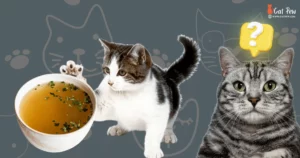
Cats are fascinating creatures with specific dietary needs that every pet owner should take into account. To ensure your feline friend thrives, it is crucial to understand the nuances of their nutritional requirements. Cats are obligate carnivores, which means that their diet should be primarily composed of meat. However, just like humans, cats also benefit from a well-rounded and balanced diet that includes appropriate hydration and occasional supplements that can be derived from non-meat sources like chicken broth. Let’s delve into the role that proper hydration and chicken broth can play in a cat’s diet and recognize the limitations of commercial broth products.
Importance Of Hydration In Cats
Hydration is a cornerstone of any living creature’s health, and cats are no exception. Cats often have a low thirst drive and can be at risk of chronic dehydration if not provided with moisture-rich foods. This can lead to health issues such as urinary tract infections and kidney problems. Providing your feline with multiple water sources, including diluted chicken broth, can encourage drinking and help maintain a healthy hydration level.
Role Of Chicken Broth In A Cat’s Diet
Chicken broth can be a delightful addition to a cat’s regimen, offering both flavor and nutrition. When prepared properly, it becomes a rich source of hydration and can even entice picky eaters to consume their meals. It contains nutrients like amino acids and minerals that can be beneficial, provided it’s free from harmful additives such as onions, garlic, and excessive salt, which can be toxic to cats. Diluted chicken broth is less concentrated, making it safer and more suitable for cats’ sensitive digestive systems.
Recognizing Commercial Broth Limitations For Cats
It’s vital to recognize that not all broths are created equal, especially when it comes to commercial products. Many store-bought broths contain preservatives and seasonings that can be harmful to cats. Always check the label for ingredients that could pose risks to your cat’s health. Ideally, opt for broth formulated explicitly for cats or make a homemade version, where you can control what goes into it, ensuring you dilute it appropriately for your pet’s safe consumption.
Identifying Safe Chicken Broth
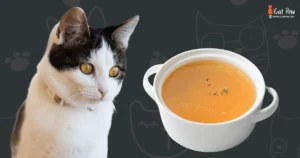
Identifying Safe Chicken Broth is crucial when considering giving your feline friend a tasty treat. Cats often enjoy the savory flavor of chicken broth, and it can even be beneficial for hydration or enticing a picky eater. However, it’s essential to remember that not all chicken broths are safe for cats. Some may contain ingredients that are harmful to your pet. To ensure your beloved cat enjoys the benefits without any risks, let’s delve into what distinguishes a cat-friendly chicken broth from the rest.
Spotting Additives To Avoid
- Onion and Garlic: These common ingredients are toxic to cats, even in small quantities.
- Salt: Excessive sodium can lead to dehydration and other cat health issues. Opt for low-sodium or unsalted options.
- Sugar and Sweeteners: Cats do not need sugar in their diet, and some artificial sweeteners, like xylitol, can be deadly.
- Preservatives and Colorants: Chemicals added for shelf life or appearance may be harmful to cats.
The Significance Of Organic And Homemade Broths
Organic chicken broth implies fewer pesticides and no genetically modified organisms (GMOs), which generally translates to a safer option for your cat. The benefits of organic broth include the absence of potentially harmful agricultural chemicals that can accumulate in a cat’s system.
Meanwhile, homemade chicken broth puts you in control of the ingredients, ensuring a pure, cat-safe concoction. Consider the following advantages:
- You can ensure the broth is free from harmful additives.
- It allows you to adjust the consistency easily for dilution.
- Homemade broth can be tailored to your cat’s preferences, potentially improving appetite.
Can I give my cat diluted chicken broth? Absolutely, but it’s imperative to use the proper type. A safe, diluted organic or homemade broth can be an excellent way to hydrate your cat and provide a flavor boost to their meals.
Preparing Chicken Broth For Cats
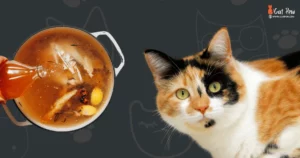
Homemade chicken broth can be a tasty addition to your cat’s diet, providing hydration and flavor. However, it’s crucial to prepare it correctly to ensure it’s safe and healthy for your feline friend. Below are the steps to create a cat-appropriate chicken broth, from selecting the right chicken parts to diluting the broth for their consumption.
Choosing The Right Chicken Parts
The first step in making chicken broth for cats is to select the proper chicken parts. For a nutritious and safe broth, consider the following aspects:
- Avoid bones that can splinter and cause harm.
- Choose lean cuts, such as the breast, to prevent excess fat.
- Organic or free-range chicken is preferable to avoid hormones and pesticides.
By selecting the most beneficial parts of the chicken, you create a healthy base for your cat’s broth.
Steps For Making Cat-friendly Broth
- Gather the ingredients: Choose the chicken parts as mentioned above and have fresh water ready.
- Thoroughly rinse the chicken to remove any debris or contaminants.
- Place the chicken in a pot, cover it with water, and bring it to a simmer.
- Cook gently for at least 1 hour to extract flavors and nutrients.
- Skip seasoning; onions, garlic, and certain spices can be toxic to cats.
- Strain the broth to remove all solid parts, ensuring it’s bone-free.
- Let the broth cool down before serving.
- Dilute the broth as needed with water for easier digestion.
So, can I give my cat diluted chicken broth? Absolutely! Diluting homemade chicken broth ensures it’s gentle on your cat’s stomach and prevents any issues from concentrated nutrients or fat. Serve the diluted chicken broth as a special treat or to encourage hydration and watch your cat enjoy each sip.
How To Dilute Chicken Broth
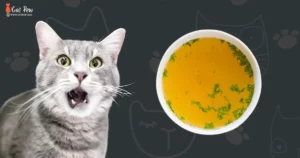
For cat owners seeking to enhance their furry friend’s hydration and nutrition, chicken broth can be a delightful treat. However, it’s crucial to dilute the broth to ensure it’s safe and suitable for your cat’s dietary needs. This post will guide you through the simple yet essential process of diluting chicken broth for your cat, offering techniques and proportions to get it just right.
Determining The Appropriate Broth-to-water Ratio
Identifying the correct broth-to-water ratio is pivotal to maintaining your cat’s health. A concentrated broth may contain too much sodium and other ingredients that could be harmful to cats in large quantities. The recommended ratio is usually one part chicken broth to three parts water, but this can vary depending on the broth’s initial concentration and your cat’s specific dietary needs.
Techniques For Consistent Dilution
Ensuring a consistent mixture each time you dilute chicken broth prevents any sudden changes in your cat’s diet. Here’s how to achieve this:
- Measure Accurately: Use a measuring cup to mix the broth and water accurately.
- Stir Thoroughly: Mix the broth and water until fully blended.
- Quality Check: Taste the broth (or test with a spoon) to ensure the flavor isn’t too rich.
- Store Properly: Keep unused diluted broth in a refrigerated container and use it within 24-48 hours.
- Record Keeping: Note down measurements and cat responses for future reference.
Introducing Broth To Cat’s Diet
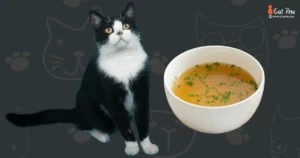
Introducing broth to your cat’s diet can provide additional hydration and nutrients that may benefit their overall health. Embracing a meticulous approach is critical when blending new items into your feline friend’s menu to avert digestive upsets. Let’s delve into pragmatic strategies you can employ while incorporating chicken broth into your cat’s feeding regimen. Follow along and discover how to methodically integrate this savory supplement for a happier, healthier kitty.
Gradual Incorporation Strategies
Commencing with minuscule amounts is paramount when adding chicken broth to your feline’s meals. Start with these straightforward steps:
- Mix a small quantity of diluted chicken broth with their regular food.
- Progressively increase the broth proportion over several days while monitoring acceptance.
- Ensure the chicken broth is low in sodium and lacks onions or garlic, which are harmful to cats.
Diluting the broth helps to acclimate your cat’s digestive system to the new ingredient. Here’s a simple dilution technique:
| Day | Broth (teaspoons) | Food | Water (ounces) |
|---|---|---|---|
| 1-2 | 1 | Usual serving | 2 |
| 3-4 | 2 | Usual serving | 2 |
| 5+ | 3 | Usual serving | 2 |
Adjust the ratio based on your cat’s specific needs, and always consult your veterinarian for personalized advice.
Gauging Your Cat’s Reaction To Broth
Vigilance is indispensable while introducing chicken broth into your cat’s diet. Monitor your cat’s behavior and digestion closely. Not all cats will respond the same way, so it is necessary to know the signs of both positive and negative reactions.
Look for healthy signs such as:
- Increased hydration
- Eager anticipation during feeding times
- Overall contentment post-meal
Conversely, recognize adverse responses:
- Gastrointestinal distress, like vomiting or diarrhea
- Change in appetite or disinterest in food
- Any behavioral shifts that hint at discomfort
If you notice any of these symptoms, decrease the amount of broth and consult with your veterinarian. Tailoring the diet to suit your cat’s preferences and health is imperative for a thriving, joyful pet.
Monitoring Broth Consumption
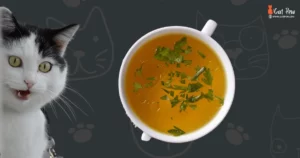
The health and happiness of our beloved feline friends are of utmost importance to pet owners, making Monitoring Broth Consumption a significant aspect of their diet management. Introducing diluted chicken broth to a cat’s diet can provide essential hydration and nutrients. However, ensuring that your cat consumes the right amount without disrupting their regular nutritional intake calls for careful monitoring. Below, we delve into the specifics of serving sizes and recognizing signs of proper hydration.
Understanding Serving Size
When it comes to feeding your cat diluted chicken broth, knowing the right serving size is paramount. Typically, a reasonable starting point is offering small portions, such as a few tablespoons, to see how your cat reacts. Adjust the serving size based on your pet’s size, age, and dietary needs, ensuring the broth is a supplement to a well-balanced diet.
| Cat Size | Serving Size (Chicken Broth) |
|---|---|
| Small | 1 tablespoon |
| Medium | 2 tablespoons |
| Large | 3 tablespoons |
Remember to provide fresh, clean water alongside the broth to maintain a balanced hydration level.
Signs Of Proper Hydration In Cats
Cats might only sometimes show clear signs of dehydration once it’s quite advanced, which is why it’s crucial to know the signs of proper hydration. You can tell that your cat is well-hydrated by observing a few key indicators:
- Elastic skin, which snaps back quickly when lightly pinched
- Moist and pink gums, as opposed to dry or pale
- Regular urination habits without any strain or discomfort
- Bright and clear eyes without any dryness
If you notice any deviations from the norm, it may be time to consult your veterinarian. Always ensure the broth is unsalted and lacks any onions, garlic, or other ingredients that could be harmful to your pet. Diluting the chicken broth appropriately is crucial: a mixture of 50% broth and 50% water is often recommended. Monitor your cat’s response and make any necessary adjustments. By following these steps, you can help your cat maintain optimal health and hydration.
Potential Broth-related Issues
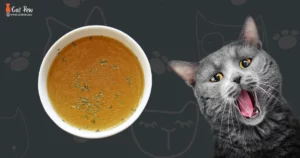
Potential Broth-Related Issues can arise when including chicken broth in your cat’s diet. While many pet owners see the benefits of broth, such as hydration and added flavor, to encourage eating, it’s essential to be mindful of the ingredients and their effects on feline health. This section will delve into the signs to watch for in your pet that may indicate too much sodium and how to identify and manage possible allergies related to broth.
Spotting Symptoms Of Excess Sodium Intake
Excessive sodium intake can be harmful to cats. Keep an eye out for the following symptoms that may show your cat is consuming too much salt through chicken broth:
- Increase in thirst: An unusual spike in water consumption.
- Increase in urination: More frequent trips to the litter box may indicate a high sodium level.
- Vomiting or diarrhea: These symptoms can result from sudden changes in diet or high sodium content.
- Poor appetite: A reduced desire to eat, which may be a sign of underlying issues.
- Unsteadiness or seizures: Severe cases of sodium ion poisoning can lead to neurological problems.
If these symptoms appear, it’s crucial to contact your veterinarian immediately. A simple adjustment to the broth’s concentration or overall diet may be needed to bring sodium levels into a safer range.
Addressing Possible Broth Allergies
While it may be less common, cats can develop allergies to components in chicken broth, including chicken itself. Signs of a possible allergy include:
- Skin irritation: Look for signs of itching or redness on your cat’s skin.
- Gastrointestinal upset: Watch for symptoms like vomiting or diarrhea after broth consumption.
- Respiratory issues: Difficulty breathing or wheezing can be a severe allergic reaction.
To address potential allergies, consult with your veterinarian. They may suggest an elimination diet to pinpoint the exact cause or recommend hypoallergenic food options. Always introduce new foods slowly to monitor your cat’s reaction and ensure their well-being.
Alternatives To Chicken Broth
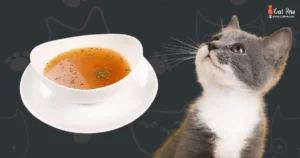
While chicken broth can be a delightful treat for cats, it’s essential to be mindful of the sodium content and any added ingredients that may not be suitable for our feline friends. Fortunately, there are numerous alternatives to ensure cats stay hydrated and receive the necessary nutrients without potential health risks. Let’s dive into some of these options and consider homemade and store-bought solutions that meet your cat’s hydration needs.
Discussing Other Hydration Options
Cats inherently have a low thirst drive, which can lead to dehydration if not adequately addressed. To keep your furry companion adequately hydrated, consider the following hydration boosters:
- Water: The simplest alternative is fresh, clean water. Make it more enticing by placing multiple water bowls around the house or using a cat water fountain.
- Tuna or salmon water: After draining water from a can of tuna or salmon, it can be offered to your cat. Ensure it’s from a product packaged in water without added salt.
- Bone broth: A nutritious alternative, bone broth is rich in vitamins and minerals. Ensure it is free from onions, garlic, and excessive salt.
- Specialized cat hydration supplements: These are formulated to support hydration and can be added directly to your cat’s water.
Homemade Vs. Store-bought Alternatives
Making your cat-friendly broths at home allows complete control over the ingredients, ensuring the avoidance of harmful additives and the tailoring of the recipe to your cat’s preferences and dietary needs. Here’s a comparison between homemade and store-bought options:
Alternatives To Chicken Broth
While chicken broth can be a delightful treat for cats, it’s essential to be mindful of the sodium content and any added ingredients that may not be suitable for our feline friends. Fortunately, there are numerous alternatives to ensure cats stay hydrated and receive the necessary nutrients without potential health risks. Let’s dive into some of these options and consider homemade and store-bought solutions that meet your cat’s hydration needs.
Discussing Other Hydration Options
Cats inherently have a low thirst drive, which can lead to dehydration if not adequately addressed. To keep your furry companion adequately hydrated, consider the following hydration boosters:
- Water: The simplest alternative is fresh, clean water. Make it more enticing by placing multiple water bowls around the house or using a cat water fountain.
- Tuna or salmon water: After draining water from a can of tuna or salmon, it can be offered to your cat. Ensure it’s from a product packaged in water without added salt.
- Bone broth: A nutritious alternative, bone broth is rich in vitamins and minerals. Ensure it is free from onions, garlic, and excessive salt.
- Specialized cat hydration supplements: These are formulated to support hydration and can be added directly to your cat’s water.
Homemade Vs. Store-bought Alternatives
Making your cat-friendly broths at home allows full control over the ingredients, ensuring the avoidance of harmful additives and the tailoring of the recipe to your cat’s preferences and dietary needs. Here’s a comparison between homemade and store-bought options:
| Homemade | Store-Bought |
|---|---|
| No added preservatives or chemicals | May contain preservatives and additives |
| Customizable salt and seasoning levels | Salt and seasonings are predetermined |
| Requires time and effort to prepare | Convenient and ready to serve |
| Possible to make it in large batches and freeze | Limited by product availability and shelf-life |
While store-bought options offer convenience, they often have a higher risk of unwanted ingredients. In contrast, homemade broths ensure a healthier and more customizable choice. Regardless of the choice between homemade or store-bought, always opt for products specifically designed for cats or recipes that are safe and suitable for their dietary requirements. This ensures your cat reaps the benefits of hydration without compromising their health.
Frequently Asked Questions Of How To Dilute Chicken Broth For Cats
Can I Give My Cat Diluted Chicken Broth?
Yes, you can dilute chicken broth for your cat, but it’s essential to do it properly.
Can Kittens Have Diluted Chicken Broth?
Kittens can have diluted chicken broth in moderation. It should be free from additives and not replace their regular diet. Always consult with a vet before introducing broth to a kitten’s diet.
Why Dilute Chicken Broth For Cats?
Diluting chicken broth is vital for cats because it reduces sodium levels, making it safer for their consumption. Serving undiluted broth can lead to excessive sodium intake, which isn’t healthy for felines.
How Much Water Should Be Mixed With Broth for Cats?
When diluting chicken broth for cats, a safe ratio is 50:50, mixing equal parts water and broth. This balance ensures the flavor appeals to the cat while maintaining a safe nutrient and sodium level.
Is Store-bought Chicken Broth Safe For Cats?
Store-bought chicken broth can be safe for cats if it’s free of onions, garlic, and excessive sodium. Always choose low-sodium, preservative-free options and dilute before serving.
How Should I Dilute Chicken Broth For My Cat?
To dilute chicken broth for your cat, mix it with an equal amount of water. This helps reduce the sodium content and makes it gentler on your cat’s digestive system.
How Often Can I Give Diluted Chicken Broth To My Cat?
It’s best to offer diluted chicken broth as an occasional treat rather than a regular part of their diet. Moderation is key to maintaining a balanced and healthy feline diet.
How Much Diluted Chicken Broth Is Safe For My Cat?
Offer diluted chicken broth in small amounts—about a teaspoon or two at a time, depending on your cat’s size. Monitor their response and adjust accordingly. Always provide fresh water alongside the broth.
Are There Any Precautions I Should Take When Giving My Cat Diluted Chicken Broth?
Always choose low-sodium or sodium-free chicken broth. Additionally, monitor your cat for any signs of allergies or digestive upset. If you notice any adverse reactions, consult your veterinarian.
Can I Use Homemade Chicken Broth For My Cat?
Yes, homemade chicken broth can be a good option. Ensure it is free from onions, garlic, and excessive salt. Also, strain the broth to remove any bones or small particles that may pose a choking hazard.
Conclusion Of How To Dilute Chicken Broth For Cats
In conclusion, diluting chicken broth for cats can be a simple and beneficial way to ensure your feline friend stays hydrated and receives essential nutrients. By following the proper guidelines and using high-quality ingredients, you can provide your cat with a tasty and nourishing addition to their diet. Remember to monitor your cat’s intake and consult with a veterinarian if you have any concerns about their health or dietary needs. With care and attention to detail, diluting chicken broth for your cat can contribute to their overall well-being and happiness. So go ahead, give it a try, and watch your cat enjoy the benefits of this delicious treat!

Winston
I'm Winston, the author of this feline-focused (Catpew.com) blog . My love for cats goes back to my childhood, when I spent countless hours playing with my family's tabby, Mittens. This furry friend instilled in me a deep appreciation for the unique personalities, playful nature, and unconditional love that cats offer.

